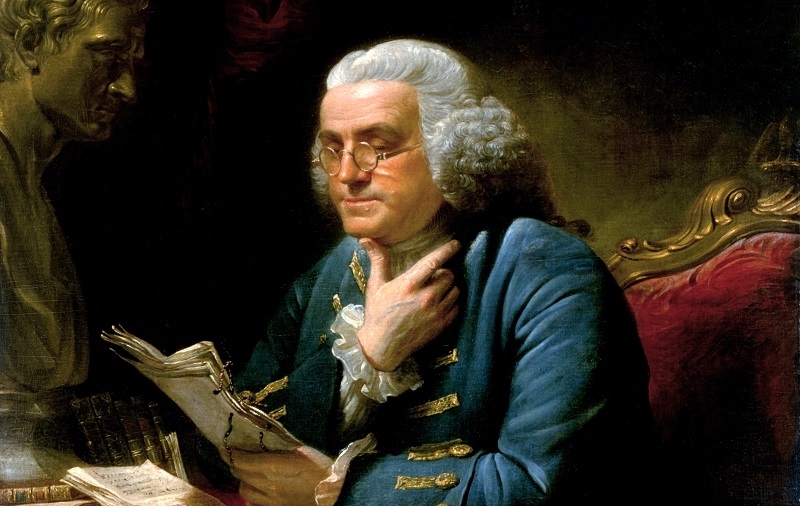The quintessential self-made man Benjamin Franklin had one of the most remarkable lives in recorded history. He went from humble upbringings to founding a country. Even by modern standards Franklin was a busy man, pursuing excellence in many endeavors and succeeding most of the time.
Have you ever made a pros and cons list? You can thank Franklin for making it popular. The man was an avid journaler who created a format to track his goals and daily accomplishments, holding himself accountable to what he wrote.
Franklin took a different approach to his journaling. While most of us are taught to write down and visualize our goals, we are rarely taught to measure them against any set of moral codes. This is where Franklin’s method differed.
Franklin created his own set of cardinal virtues, 13 of them. He based his goals and daily actions around these 13 virtues and he held himself accountable to them by tracking his progress.
In his journal he would place a small black dot next to the virtue that he did not do well with that day. At the end of the day he had to honestly report back to himself and look in the mirror to determine if he was living up to the standards he had set.
Each week he would focus on one virtue and keep track of the others. He would then move on to the next virtue. Through this method he would go through four cycles of each virtue every year. This pragmatic approach ensured he gave equal sway to each of his virtues, resulting in a balanced approach overall.
Franklin’s genius was that he insisted on creating his own intrinsic virtues based on introspection and a rigorous definition of personal integrity. They came from the inner voice and they were specifically chosen to improve his character. He had the right starting point.
One can surmise that Franklin’s many accomplishments were not the result of being a goal-oriented individual. Franklin was a character oriented individual. With continued elevation of his character, his accomplishments came naturally.
There is a great lesson there. Our society has become one where extrinsic rewards are favored far more than the internal reward of living in line with our own moral barometer, but our worldly success is intrinsically tied to our ethics. At least Franklin thought so.
Franklin’s journal was structured much like how a professional weightlifter might track a workout program. It wasn’t filled with flights of fancy although it was imaginative. It was a stoic endeavor.
So what virtues did Franklin employ in developing his extraordinary life?
“Temperance: Eat not to dullness; drink not to elevation.”
“Silence: Speak not but what may benefit others or yourself; avoid trifling conversation.”
“Order: Let all your things have their places; let each part of your business have its time.”
“Resolution: Resolve to perform what you ought; perform without fail what you resolve.”
“Frugality: Make no expense but to do good to others or yourself; i.e., waste nothing.”
“Industry: Lose no time; be always employ’d in something useful; cut off all unnecessary actions.”
“Sincerity: Use no hurtful deceit; think innocently and justly, and, if you speak, speak accordingly.”
“Justice: Wrong none by doing injuries, or omitting the benefits that are your duty.”
“Moderation: Avoid extremes; forbear resenting injuries so much as you think they deserve.”
“Cleanliness: Tolerate no uncleanliness in body, clothes, or habitation.”
“Tranquility: Be not disturbed at trifles, or at accidents common or unavoidable.”
“Chastity: Rarely use venery but for health or offspring, never to dullness, weakness, or the injury of your own or another’s peace or reputation.”
“Humility: Imitate Jesus and Socrates.”
Not all of Franklin’s virtues would necessarily be the right ones for everyone to adopt, but they do make for a good starting point.
Not everyone embraces a set of values prescribed to them by society or religion. Extrinsic values only tend to take us so far, which is one of the reasons many people fail to realize their potential. But taking the time to develop and follow our own moral codes might just put us on the same track to success that Franklin took.
Franklin admittedly never achieved his goal of moral perfection but he did say this: “Tho’ I never arrived at the perfection I had been so ambitious of obtaining, but fell far short of it, yet I was, by the endeavour, a better and a happier man than I otherwise should have been if I had not attempted it.”
So why not go and journal like Franklin did. You might just be a better (wo)man for it.
Ryan Moffatt is a Vancouver-based arts reporter, musician, and pop-culture pundit.

